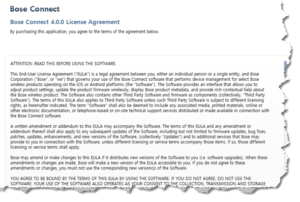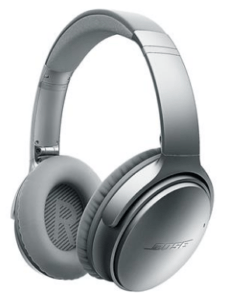Fake claim: Bose Spyphones
 Fake claim: Bose Spyphones: a reader asks…
Fake claim: Bose Spyphones: a reader asks…
I have a pair of Bose headphones which I use on airplanes for blessed silence while in-flight. I recently read about my headphones spying on me (https://www.washingtonpost.com/news/the-switch/wp/2017/04/19/bose-headphones-have-been-spying-on-their-customers-lawsuit-claims/?utm_term=.014275e2a6c7). Do I need to worry?
Umm, no. I’m calling that article and others like it ‘clickbait’. The title reads falsely. Your Bose headphones have no capability to do any spying on you. All they can do is cut ambient noise down, and when connected to your smartphone, play the music output by whatever app you use to play or stream music.
 What annoys me most about clickbait is that they put the accusation first, followed up by a minor disclaimer. Furthermore, when you read the article, the lawsuit involves not the Bose headphones, but an optional Bose app you can install on your smartphone. I’m sure the author of the article wanted to keep the title short, but doing so substantially changed the meaning. It’s like there was an article title tied to a completely different article. That’s the very definition of clickbait.
What annoys me most about clickbait is that they put the accusation first, followed up by a minor disclaimer. Furthermore, when you read the article, the lawsuit involves not the Bose headphones, but an optional Bose app you can install on your smartphone. I’m sure the author of the article wanted to keep the title short, but doing so substantially changed the meaning. It’s like there was an article title tied to a completely different article. That’s the very definition of clickbait.
Clickbait is a mostly pejorative term describing web content that is aimed at generating online advertising revenue, especially at the expense of quality or accuracy, relying on sensationalist headlines or eye-catching thumbnail pictures to attract click-throughs and to encourage forwarding of the material over online (source: https://en.wikipedia.org/wiki/Clickbait)
Advertisement
 Of course, the title of my own article also could be considered as clickbait, but at least I’m putting the disclaimer first. Moving on, as you can guess all software apps require the user to agree to an End-User License Agreement (EULA) if you want to install and use the app. Nobody ever reads a software EULA, it’s full of arcane legal language which usually boils down to ‘we can do whatever we want’. I did take a look at the licensing agreement for the Bose Connect app, and it pretty specifically eliminates Bose’ liability for unproven damages to any user. So the citizen who lodged the lawsuit is going to have to prove that Bose did something with personally identifiable data that caused damage to the user. Tall order methinks.
Of course, the title of my own article also could be considered as clickbait, but at least I’m putting the disclaimer first. Moving on, as you can guess all software apps require the user to agree to an End-User License Agreement (EULA) if you want to install and use the app. Nobody ever reads a software EULA, it’s full of arcane legal language which usually boils down to ‘we can do whatever we want’. I did take a look at the licensing agreement for the Bose Connect app, and it pretty specifically eliminates Bose’ liability for unproven damages to any user. So the citizen who lodged the lawsuit is going to have to prove that Bose did something with personally identifiable data that caused damage to the user. Tall order methinks.
 I think (and hope) the citizen who lodged the lawsuit is going to find himself with a large legal bill to pay, and I’m hoping that Bose doesn’t pay money to settle the situation and avoid potentially damaging media coverage. What I expect Bose will say is that their app does what all other apps do, collect information about usage that they can use and/or resell in aggregate, primarily to improve their product. In no way would they do anything with personally-identifiable information. I should mention that Google and Amazon are great at spying on your activities to better target advertising to you. Given that the Bose app is free, one can hardly fault them for collecting usage information to use in aggregate form for whatever legal purpose they want.
I think (and hope) the citizen who lodged the lawsuit is going to find himself with a large legal bill to pay, and I’m hoping that Bose doesn’t pay money to settle the situation and avoid potentially damaging media coverage. What I expect Bose will say is that their app does what all other apps do, collect information about usage that they can use and/or resell in aggregate, primarily to improve their product. In no way would they do anything with personally-identifiable information. I should mention that Google and Amazon are great at spying on your activities to better target advertising to you. Given that the Bose app is free, one can hardly fault them for collecting usage information to use in aggregate form for whatever legal purpose they want.
Sorry if I got carried away by the politics of the situation – in short I think you have nothing to worry about, keep enjoying your Bose headphones and don’t worry about being spied upon.
This website runs on a patronage model. If you find my answers of value, please consider supporting me by sending any dollar amount via:
or by mailing a check/cash to PosiTek.net LLC 1934 Old Gallows Road, Suite 350, Tysons Corner VA 22182. I am not a non-profit, but your support helps me to continue delivering advice and consumer technology support to the public. Thanks!






